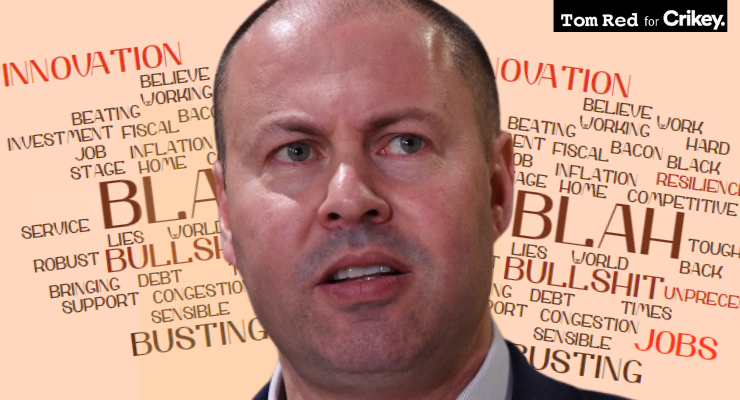
When I think of Scott Morrison — and to some extent Anthony Albanese — I’m reminded of big-talking boyfriends who never quite deliver on their promises. Diamonds that ended up cheap zirconia.
And it’s illustrated with startling clarity with each election, and each budget.
At a first and superficial glance, tonight’s budget looks like the impetus to lift us all — diamonds everywhere. A faster rail line from Sydney to Newcastle. Help with the cost of living, with fuel excise at top of mind. A national offenders’ register. Millions for missiles. A childcare subsidy. A lure for international tourists. Massive defence recruitment. A submarine base. Environmental initiatives that span from the Great Barrier Reef in Queensland to the forests of Tasmania.
Everyone wins. Millions thrown at domestic violence intervention and suicide prevention. More money than you can poke a stick at will go into infrastructure projects. Health and education too will get a boost.
And that promise of diamonds will be the starter’s pistol on a poll Prime Minister Scott Morrison and Treasurer Josh Frydenberg desperately hope will see the Coalition reelected.
But here’s the pinch. None of that is really aimed at growing our nation and beating the challenges posed by a pandemic, natural disasters and innovation. It’s about winning our votes.
This is a campaign budget. Not a future budget.
In fairness, the Coalition didn’t think up this modus operandi. It is almost always the case in state and federal politics that the budget closest to the election is more about charting the government’s future than the country’s.
The problem here is the massive opportunity cost of what is not delivered with this old-school, traditional cyclical and cynical style of thinking and service delivery.
Politics must be the last bastion of society that hasn’t had disruption shape a way of thinking where strategy and culture envelop the whole process, not individual divisions that in this case partition the environment from education and health from infrastructure.
So yes, the environment will have a win. So will health. And so will voters in various electorates. But is that visionary government? Will that ad hoc division of funds in any way forge a new future? Or will it just slap bandaids on where they are desperately needed?
How could this budget deliver a new future for our youth — young men and women who have spent almost three years treading water, missing key milestones, fighting mental health challenges, studying from home, and trapped in isolation?
This doesn’t mean just fixing the year-long wait for a psychologist’s visit. It means fundamentally looking at the school and university systems, the curriculum and how it is delivered, apprenticeships and courses to ensure they are fit for an uncertain future. It might mean partnering with Mental Health Australia, for example, to reduce suicide deaths by 25% by 2025.
It means talking to 16-year-olds who are skipping school, or studying until 1am, fearful of a future they can’t imagine. About 600,000 people will vote for the first time this election; a genuine across-the-board strategy aimed at the young would not just deliver for them, but all of us.
How could this budget deliver a cure for cancer? That sounds a bit Mary Poppins-like, but could it be possible if we wanted it badly enough? How could a government, hell-bent on making a difference, coerce the universities and the best scientific minds to work together with funds that would not run out in a year?
No matter how bright we are, cancer will not be cured while scientists and researchers are given an annual contract or paid by individual research project. Imagine a budget legacy that meant a new way of thinking and delivering research funding.
Or what if we spent serious funds looking at domestic violence? I don’t mean the state auctions we have now on who can get the most publicity after another heartbreaking murder, but a sustained and funded conviction to being the world leader in making women safe.
Imagine that.
Is this the fault of political parties? Politicians in power? Or us, as voters? Are we demanding the same standard of our politicians as we do from those around us?
This post-budget election by itself will cost about $400 million. The question — like ones we’ve all pondered with a new boyfriend, surely — has to be: is this what I really want?








Ah, the vision thing. Sight unseen, you just know it’ll be missing from this budget
Fortunately for me I am very old and can remember when we did have a government with some vision – and it ranged across a gamut of issues of concern to ordinary people. Gough Whitlam was its leader.
A Fairy Godmother Budget – from the big talking Coalition with an election to buy – after the election everything turns back to merde, with an extenuating excuse.
“Government predictions”? From a Coalition government that’s made an artform of artifice, dabbles in duplicity, with a penchant for porkies, an allergy to accountability and a hobby of hypocrisy.
Lovely bit of whataboutism around Albanese – please explain to us, Madonna, what opportunity an opposition leader has to deliver on anything in opposition – they aren’t the government. Can’t write a straight sentence without dragging the opposition down the equivalent.
Old habits – professional Coalition mitigation.
Yep, once a Murdoch hack . . .
Well, for starters an opposition leader could criticise crap govt action and outline how they would be better. We’ve seen almost no criticism on lib’s Covid action, very little on alternative climate change policies, tepid affordable housing policies and recently virtually nothing on the terrible flood response by libs. The sitting labor mp for Lismore has been MIA. Pathetic!
“Is this the fault of political parties? Politicians in power? Or us, as voters? Are we demanding the same standard of our politicians as we do from those around us?”
It’s primarily the fault of the deeply flawed idea of government by elected representatives, which is falsely called democracy. Where there are elections there are parties, and parties who get a sniff of power are corrupted by powerful bodies who buy advantages for themselves. This is made much worse in Australia by very frequent elections and the funding of major parties which frees them from any need for real popular support or mass membership.
So it could be improved somewhat by extending the period between elections and, better still, making it impossible for any party to get any funding except for tightly limited personal donations from individual Australian citizens. If the maximum donation from anyone was $100 a year parties would suddenly be awfully keen to pay real attention to the public.
But the far better answer is to get rid of the curse of elections. All our representatives should be selected randomly from the population that are currently voters. That is currently done (imperfectly, but that can be sorted) for juries in criminal trials and it is the only really democratic element in our whole constitution.
Politicians should spend many hours wading through piles of boring materials to understand complex legislation. How many ‘randoms’ could or would do this?
They should but do you imagine they do? Can you be that naive? The bulk of the wading is done by public servants, special advisors, lobbyists and others. Nearly all representatives in the major parties simply vote as they are told and would never waste time reading bills or related material. What would be the use? Believe me, I speak from experience in preparing legislation.
You make a good point about complexity. If we had a randomly selected parliament it might very quickly object to being given incomprehensible gobbledegook and insist on legislation clearly drafted and explained. The result would be a major benefit for us all and a big improvement in the rule of law. (See The Rule of Law by Tom Bingham.) It would certainly be no worse than the present farce.
We have a Swiftian situation – the Yahoos wiggle the ears of their superiors, the ruling Houyhnhnms – except that our lot lack even horse sense.
Pre-election Coalition budgets may as well be penned by Hans Christian Andersen because they belong in the fiction category, distanced from reality. Fantasy served to the electorate.
As for living happily ever after ….